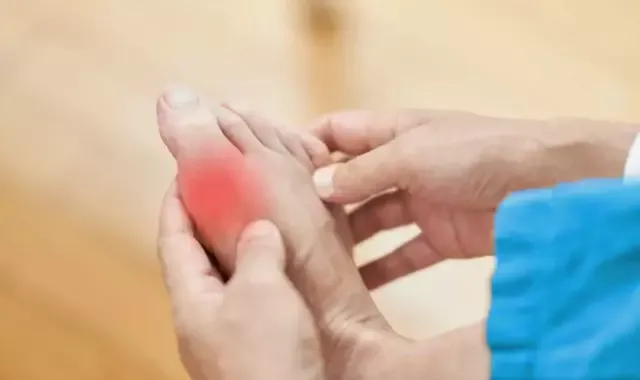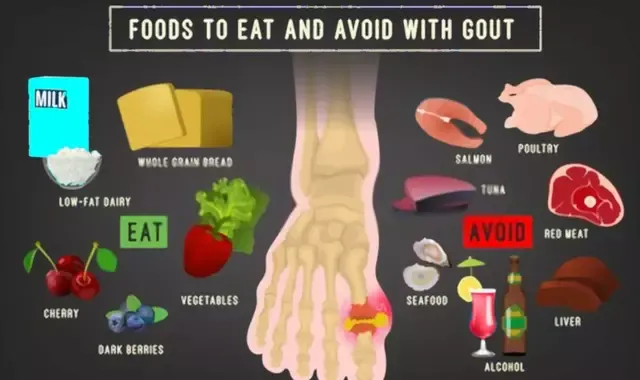What is Gout?
Gout is an inflammatory arthritis that develops as a result of high levels of uric acid in the body.
Uric acid is a waste material resulting from the breakdown of purines, which are part of all human tissue and are found in many foods, especially those high in protein.
If there is hyperuricemia, or what we call too much uric acid in the blood, it means that uric acid is overly produced or not excreted in the body.
This excess uric acid can still accumulate, crystallize, and then deposit in certain joints, most commonly in the big toe, and this can lead to attacks of inflammation.
This inflammation causes sudden, severe episodes of pain, tenderness, redness, warmth, and swelling in the affected joint, which can last for a few days if untreated.
The higher the level of uric acid, the greater the incidence of gout.
Diagnosis entails having a compatible clinical picture of acute joint swelling, demonstration of elevated uric acid levels in the blood, and detection of uric acid crystals in affected joints through joint spiration or imaging.
Gout is a metabolic disease. That is one of the oldest human diseases. The disorder is the result of eating high in Purine foods.
What causes gout?
If a person consumes large amounts of alcohol, that may cause disorders in the excretion of urine.
It can cause gout.
Some people have a hereditary tendency to the disease.
Some medications can cause this disease. Kidney patients have a higher risk of getting sick.
What are the symptoms of Gout?
An attack of gout can happen very quickly and is not associated with a traumatic event. Symptoms of gout include:
Sudden onset of significant pain in the 1st metatarsophalangeal joint of the big toe.
A red, hot, and swollen 1st metatarsophalangeal joint.
Significant pain in touching the affected joint (even attempting to put your socks on can cause high levels of pain).
Pain on moving the big toe.
Pain when walking.
This topic should not serve as a replacement for professional health or medical advice.
Always consult a health professional before starting a new exercise or fitness program.
Please stop and consult a physiotherapist if these exercises cause you pain.
Gout Treatment
Gout is treated with diet and medication.
A sick person should eat food without purines, he/she should reduce alcohol intake to a minimum and he/she should drink at least 3 liters of liquids per day.
Foods to Avoid with Gout
Here’s the List of Foods that should be particularly avoided during Diet for Gout:
1. Meat contains a lot of purine. You can eat red meat and chicken in small amounts. Avoid Processed Meats. Avoid all types of Offal.
2. Avoid Fish and Seafood. Sardines, Herring, Mackerel, Oysters, Lobster, and Shellfish contain high levels of purine.
3. Whole-grain cereals contain purine. Eat them little, in a Diet for Gout.
4. Avoid sugar in a Diet for Gout.
5. Avoid certain types of vegetables: Asparagus, Cauliflower, Spinach, Beans, and Peas.
6. Avoid yeast in your Gout Diet.
7. Avoid sparkling drinks and coffee.
8. Avoid alcohol (In particular, avoid beer).
Gout Treatment Diet
You can eat small amounts of Meat. Whenever you can, substitute Meat and Processed Meat with eggs.
Feel free to eat: Milk, Yogurt, Sour Cream, Cottage Cheese, Cheese made with skimmed milk, Butter.
You can Eat Vegetable fats.
Feel free to eat all kinds of Fruits and Dry fruits. The cherries are the best, old-fashioned medicine for Gout Treatment.
The best Vegetables for you are Beets, Turnips, and Carrots.
It’s allowed to eat up to 150g of Bread and Toast bread a day. Don’t eat cornbread and rye bread.
Feel free to eat Pasta, Boiled potatoes, and Rice.
You can eat Honey or Sugar (up to 50 grams per day).
In your Gout Diet, You need to use: Barley, Oats, and Wheat.
You should drink at least 3 liters of liquids per day.
You should limit alcohol to one glass of wine a day.
An important note: In a Diet for Gout, use fresh foods or foods that are short-cooked or baked. This type of Gout Diet improves digestion and relieves pain.
Natural Cures for Gout Treatment
1. Eat half a cup of Cherries per day
2. Drink made from kombucha
3. Celery juice: Peel the celery and then squeeze it. Add a little lemon juice. Drink fresh juice, immediately.
4. Carrot juice is also recommended in Gout Treatment.
5. Bay Leaf is a known traditional cure for Gout Treatment.
Chopped 5 bay leaves.
Pour in a pint of boiling water.
Boil it for five minutes on medium heat. Let it stand, until the next day. Strain.
Drink all the tea during one day, but with mandatory breaks. This tea should be consumed only for 3 days.
Teas will help you to ease the pain: Drink Chamomile tea, Mint tea, and Dandelion tea.
An important tip: If you are overweight, you should lose weight. Overweight people suffer from gout more often than those with ideal body weight.
Gout, inflammatory arthritis caused by high levels of uric acid, can lead to painful attacks of joint inflammation, particularly affecting the big toe.
The condition is commonly linked to the overproduction or inadequate excretion of uric acid in the body. While gout has been recognized as one of the oldest human diseases, its prevalence is influenced by various factors, including hereditary tendencies, certain medications, and an increased risk for individuals with kidney issues.
Prompt diagnosis involves assessing clinical symptoms, elevated uric acid levels, and the presence of uric acid crystals in affected joints. Treatment for gout typically involves a combination of dietary modifications and medication.
A gout-friendly diet should limit the consumption of purine-rich foods, such as certain meats, fish, seafood, and vegetables, while encouraging the intake of low-purine alternatives, including eggs, dairy products, fruits, and selected vegetables.
Additionally, natural remedies like cherries, kombucha, celery juice, carrot juice, and bay leaf tea have been suggested to alleviate gout symptoms.
It is important to note that these remedies should complement professional medical advice and should not replace proper consultation with healthcare professionals.
Furthermore, weight management plays a significant role in gout prevention, as overweight individuals are more susceptible to the condition.
By adopting healthy lifestyle choices and following medical guidance, individuals can effectively manage gout and reduce the frequency and severity of painful flare-ups.
FAQs
Q: What is gout?
Gout is an inflammatory arthritis caused by high levels of uric acid in the body.
Uric acid is a waste material resulting from the breakdown of purines found in human tissue and certain foods.
Q: What causes gout?
Gout can be caused by factors such as overproduction or inadequate excretion of uric acid, excessive alcohol consumption, hereditary tendencies, certain medications, and a higher risk for individuals with kidney issues.
Q: What are the symptoms of gout?
Symptoms of gout include sudden and severe pain, redness, swelling, and warmth in the affected joint, typically the big toe.
Pain can be experienced when touching the joint, moving the toe, or walking.
Q: How is gout diagnosed?
Diagnosis involves assessing clinical symptoms, elevated uric acid levels in the blood, and the detection of uric acid crystals in affected joints through joint aspiration or imaging.
Q: How is gout treated?
Gout is typically treated with a combination of dietary modifications and medication.
A gout-friendly diet involves avoiding purine-rich foods while incorporating low-purine alternatives. Medications may include anti-inflammatory drugs and urate-lowering therapies.
Q: What foods should be avoided in a gout diet?
Foods high in purines should be avoided, including red meat, organ meats, seafood (such as sardines and shellfish), whole-grain cereals, certain vegetables (like asparagus and spinach), yeast, sparkling drinks, coffee, and alcohol, especially beer.
Q: What foods are recommended in a gout diet?
In a gout diet, small amounts of meat can be consumed, with a preference for eggs as a substitute.
Dairy products made from skimmed milk, vegetable fats, fruits, dry fruits (especially cherries), beets, turnips, carrots, limited bread and toast bread, pasta, boiled potatoes, rice, honey or sugar (in moderation), and grains like barley, oats, and wheat are generally permitted.
Q: Are there any natural remedies for gout?
Some natural remedies that may help alleviate gout symptoms include consuming cherries, drinking kombucha, celery juice with lemon, carrot juice, and bay leaf tea.
Chamomile tea, mint tea, and dandelion tea are also known to provide relief.
Q: Can gout be prevented?
Maintaining a healthy weight, following a balanced diet low in purines, limiting alcohol consumption, staying hydrated, and seeking medical advice can help prevent gout or reduce its frequency and severity.
Q: Can I rely solely on natural remedies for gout treatment?
While natural remedies may provide some relief, it is important to consult with healthcare professionals for an accurate diagnosis and appropriate treatment.
Natural remedies should be used as complementary approaches alongside medical advice and prescribed medications.




